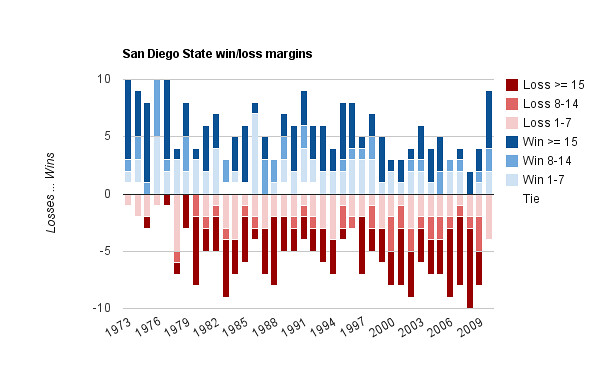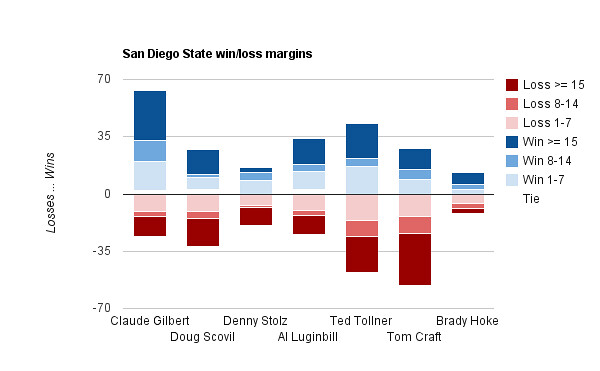A Heartbreaking Diary of Staggering Genius
[Ed-M: Bumped for excellence]
OK, this is not actually a work of staggering genius. You should definitely read the Dave Eggers book it refers to, though - good stuff.
Rather, it is a brief and simple explanation of everything that has happened or will happen in Michigan football. It is based on one simple idea: if you win a lot, you are a genius. If you win most of the time, the fans will grumble but tolerate you. If you lose a lot, you will get fired. I think we all know this.
To make this case, I have simply plotted the wins and losses over the years on the following bar chart, broken down by margin of victory. Here is the graph:

As you can see, the years increase over the x-axis (horizontal direction), and the number of wins and losses are plotted on the y-axis (wins go up from 0, losses go down; ties, when they still happened, are split as half for a win and half for a loss). Wins are broken down into three categories: wins by 15 or more (navy blue), wins by 8-14 (blue), and narrow wins by 7 or less (light blue); losses are similarly split apart, and ties are left white.
I think the graph shows a few important things. First, what an amazing run we had as fans. For almost 40 years, watching Michigan football meant losing a couple or three (close) games, and winning the rest; I wonder if there is any stretch like that in modern football history.
Second, and perhaps most key, is the era that spoiled us: Bo's first five years. What a f***ing first impression that man made! After a "pedestrian" 9-3 season in which he upset the best OSU of all time, Bo's next four years featured: a 1970 loss (by 11 to OSU), a 1971 loss to Stanford (by 1 in the Rose Bowl), a 1972 loss to OSU (by 3), 1973 tie (with OSU, and you know how that story ends), and a 1974 loss to OSU (by 2). Wow!
For those of you not old enough to remember (and this includes me, barely), can you imagine such an era? With a little more luck, Bo could have won three or four national championships. Simply stunning, and what a great way to turn yourself into a legend.
Third, the graph shows I think that in the following years, Bo settled into the pattern we are more used to, with a few losses here and there, and one Year of Infinite Pain before such years were named and blogged about. That year of course was 1984, a year in which Bo went 6-6, almost beat "national champion" BYU in a bowl game, and caused Bo to rededicate himself for his final stretch run.
Fourth, I think the graph shows why some people were unhappy with the Lloyd Carr era - though the general year-to-year record remained very similar to Bo's steady state (which I will demonstrate further below), there are a lot more close wins; in other words, the team continued to win at about the same pace, but more of those wins were in games that could have gone either way. And this makes sense: think back to all those last-second wins against Penn State, Michigan State, and others - we were continuing to win, but not in as dominant a fashion as we were used to.
Finally, I think the graph shows why RichRod was in no way going to get a chance to continue: too many losses, and too many of those in non-competitive games. It was just too much.
Anyhow, to sum up each coach, I also made a plot of their overall win/loss percentage. It is available here:

Instead of just showing Bo's entire history smashed into one bar, though, I separated it into the first 5 years and the rest. The first conclusion from this graph: how similar Bo, Mo, and Carr were, once you take away Bo's first five years! Almost identical, except for that one small difference: that Carr had a noticeable number more of close wins, and both Mo and Carr had a few more not-so-close losses.
And though it's unfair to take Bo's first five years out, those five years were so crazy and unusual, they should be separated and celebrated for what they were: one of the best five-year runs in modern football history. It is those years, I think, where we derive our modern expectations. We think we should always be like that, when in reality it's quite difficult to expect such near-perfection year to year. I think that expectation is what drove all the Carr grumbling, and perhaps caused us all to look to "reboot" the program instead of just "maintain" it.
Imagine a different universe where Bill Martin, instead of looking for the best national coach, was looking for someone steeped in the Michigan way, to maintain its current glory? Who would he have hired? Would one young coach at Stanford, full of Michigan spirit and not yet too full of himself, be considered for the opening? One can only wonder at what might have been, had we been happier with what we had.
[Edit: when I talk about Bo's first "five" years, I mean 1969 through 1974, which as you might have noticed, is six years.]
[Edit (2): Replaced stupid imageshack links with links to Picasa. Imageshack banned the photos; apparently too much traffic!]
January 17th, 2011 at 6:08 PM ^
We owned the "little 8", but we were good but not great on the national scene. Same for OSU.
This was not just due to playcalling, although that was a big factor. Recruiting was an issue as well. The ranks of the Pros were not exactly swelling with Michigan players back in those days.
January 17th, 2011 at 3:40 PM ^
The biggest flaw in the graphic presentation is its inability to show the condition that a team was in when a coach took over.
January 17th, 2011 at 6:13 PM ^
Sometimes we forget how much.
*Sigh* what may have been . . .
January 18th, 2011 at 1:03 PM ^
San Diego State chart by year through 2010 (Brady Hoke started in 2009)

San Diego State chart by coach


Comments